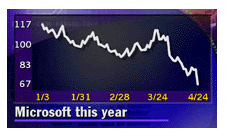|
Microsoft's bad breakup?
|
 |
April 24, 2000: 6:00 p.m. ET
Will investors end their love affair with Microsoft if the company splits up?
By Staff Writer Alex Frew McMillan
|
NEW YORK (CNNfn) - Would Microsoft investors be better off holding the stock of a number of Baby Bills? They could certainly target their investments a little better.
But there are other factors that tend to suggest investors are likely better off holding stock in the company as a whole. The news of a possible breakup was certainly given a cold shoulder on Wall Street, where Microsoft declined 15.5 percent on Monday.
Analysts aren't certain Microsoft will in fact be broken up, even if such a plan is proposed. They're also cagey about how they would value the subsequent parts. The issue is complicated by the involvement of not only the Justice Department but also 19 states, which may well want different remedies.
 Andrew Roskill, senior software analyst with Warburg Dillon Reid, said it's almost certain the U.S. Department of Justice will put forward a plan involving a breakup of some kind. But an appeal of any remedies is equally certain from Microsoft, he said. Roskill, who has a buy rating on the stock, thinks Microsoft's chances are good on appeal. Andrew Roskill, senior software analyst with Warburg Dillon Reid, said it's almost certain the U.S. Department of Justice will put forward a plan involving a breakup of some kind. But an appeal of any remedies is equally certain from Microsoft, he said. Roskill, who has a buy rating on the stock, thinks Microsoft's chances are good on appeal.
"The real question is, given that the judge is going to rule and it's going to be negative, will Microsoft successfully obtain a stay of any injunctive release," Roskill said. The case could then move to appeals court or straight to the U.S. Supreme Court.
Microsoft will likely argue its monopolistic activity did not harm consumers. In the case of tying its browser with its operating system, the company may be able to argue that it in fact helped them. Anyway, Microsoft acted in typical tech fashion, Roskill said, where the pace of change keeps companies honest and monopolies never last for long.
"The truth is everybody [in technology] behaves the way Microsoft behaves," Roskill said. You could argue that Intel has a monopoly in semiconductors, Texas Instruments in digital signal processing chips, Oracle in databases and Cisco in networking, he said. Technology moves toward a standard, which probably benefits consumers, he said.
Reports suggest the Justice Department is leaning toward a breakup of the company into two or three units, more than likely separating its operating-systems business, its applications business and its Internet based business.
More than just three parts
Analysts and antitrust experts say a Microsoft breakup would be complex. Divestitures are not necessarily negative. In fact, "great acquirers sell as many things as they buy," said Mark Sirower, who teaches mergers & acquisitions at New York University and advises with the Boston Consulting Group. When companies grow by acquisition, they often acquire businesses that don't mesh with the company as a whole. The best among them turn to their advantage, selling strategically and selling high.
If Microsoft gets good value for its parts, splitting it presents no ostensible problem, Sirower said. The problem is that the government's sanctions will likely go beyond simply creating smaller operating companies and may involve penalties or new regulation. "If they hurt the competitiveness of the company, then the shareholders are going to suffer."
Roskill said that's likely, if a breakup does come to pass. "They're going to have to do more than just break it up," Roskill said. "They're going to have to change their business practices pretty substantially."
Other sanctions could involve regulating Microsoft's pricing. The government could also require the company to get any change in its products, particularly its operating system, reviewed by a third party or the government.
Those other "handcuffs" are the main reason most analysts are not comfortable predicting the effects forced breakup.
Parts not likely to equal sum of whole
Whatever the details of the split, the odds are not good that the split would benefit investors, Roskill said. "You would have less diversified companies with less dominant positions" in their industry, he said.
Microsoft's Internet business is growing rapidly and would likely receive a high multiple, which is good news for investors. But the operating system business, which now accounts for around 40 percent of the company's revenue and 50 percent of profits, is the business most likely to face operating penalties.
If it was very highly regulated and growing at a much slower pace -- around 10 percent -- it's hard to justify a price/earnings multiple of more than 30 for the operating business, Roskill said. To match today's P/E of 49, the other businesses would need to get multiples of 80 or 90, he added.
That's unlikely. So a breakup of Microsoft is not an attractive prospect for investors, "at least on paper," he explained. The wild card is the extent the government tries not just to separate Microsoft but to change how it operates. "It remains to be seen what kind of handcuffs are put in place," he said.
Precedent paints a prettier picture
Of course, monopolies have been busted in the past. Antitrust actions brought about divestitures by railroad companies in the late teens last century and of movie theater businesses in the 1940s and early '50s. American Tobacco was also forcibly split into four parts in 1911.
But experts say the most-useful precedents of the government forcing monopolies to dissolve are the breakups of Standard Oil in 1911 and of AT&T in 1984.
 In both cases, shareholders subsequently prospered, according to William Kovacic, an antitrust expert and professor at George Washington University's law school. With Standard Oil, "even though the company predicted a calamity for shareholders ... the calamity never took place," he said. In both cases, shareholders subsequently prospered, according to William Kovacic, an antitrust expert and professor at George Washington University's law school. With Standard Oil, "even though the company predicted a calamity for shareholders ... the calamity never took place," he said.
The company's official stance was that the breakup would be detrimental. But in fact many of Standard Oil's subsidiaries welcomed the split-up, Kovacic said. At Chevron, for instance, the internal corporate history shows that the managers of what was Standard Oil's California subsidiary were pleased to slip free of headquarters.
"The public face was how frightful, but the internal sense of the company was how delightful," Kovacic explained. "There were a number of ambitious managers in charge of the subsidiaries who thought they could manage the company better than the folks at 26 Broadway."
Distinct subsidiaries helped Standard Oil, AT&T
But Microsoft is also a little different. In both the AT&T and the Standard Oil breakups, there were clearly distinct subsidiaries with their own management teams in place. They simply took over as heads of the divided units.
"I do think a restructuring of Microsoft would be more complex," Kovacic said. Teams would likely need to be disassembled, he explained. "That could be a new challenge."
Teams of engineers and software designers would have to be split apart, Kovacic said on CNNfn, which makes the breakup different from its predecessors. Click here to listen to Kovacic: (480KB WAV file) or (480KB AIFF file).
AT&T's breakup into eight companies -- AT&T and the seven regional Baby Bell companies -- is the most recent and useful precedent to study, most antitrust experts agree. Telecommunications is a growth industry like software and the case is still fairly fresh. Unlike Microsoft, though, AT&T and the Justice Department came to a settlement, first agreed on in 1982 and completed two years later.
It is not clear the breakup was positive, though the stocks of the companies have done well. A 1997 study by two professors at the University of Louisville's College of Business and Public Administration suggests that shareholders did not benefit as much post-breakup as they had when AT&T was whole.
Jay Brandi, an associate professor of finance, and S. Srinivasan, a professor of computer information systems, compared AT&T's performance in the 10 years prior to its split with how the eight companies did after the 1984 separation.
Almost every financial measure ended up declining, they conclude. Earnings, cash flow per share, dividend yields, and growth in both revenue and earnings were all better before AT&T was dissolved, they concluded. For instance, revenue growth declined to 3.5 percent a year for the eight companies, versus 11.5 percent a year prior to the split. Net margins declined to 10.0 percent from 11.56 percent.
The stocks of the eight subsequent companies were treated more like growth stocks than the value stock many investors considered the old AT&T to be, but this brought with it increased volatility.
The large amount of attention devoted to the breakup kept AT&T and its successors in the public eye, which perhaps gave the stock a bit of a boost. But even though the shareholders did quite well if they held onto the stock they received in 1984, the evidence suggests investors would have done better if AT&T had remained whole. What's more, there was no clear consumer benefit to the breakup.
Same likely with Microsoft
In fact, the benefits to investors and the benefits to consumers tend to conflict when monopolies are split apart, something the government needs to consider with Microsoft. It did not appear to consider that when AT&T was divided, Brandi said.
"There appear to be more benefits to investors leaving it the way it is," Brandi said. "And there don't appear to be significant benefits to consumers."
That surprised Srinivasan, Brandi's colleague. At best the breakup was a wash, and at worst it hurt shareholders by leading to poorer financial performance, he said. "The Department of Justice's intentions were not realized," he said. "We did not see the success of the breakup in the form of greater financial growth."
He feels a breakup of Microsoft would benefit consumers. But shareholders will likely not enjoy the same rate of growth they have gotten from the combined entity, he said. Then again, "they have already reaped pretty good benefits over the years, so I would not put that as a high priority," Srinivasan said.
Unfortunately the interests of Microsoft shareholders seem to conflict with the interests of consumers.
"Based on the AT&T experience, my feeling is financial growth would not be as significant. But consumers would benefit very much," he said. 
|
|
|
|
|
|
Track your stocks
|
Note: Pages will open in a new browser window
External sites are not endorsed by CNNmoney
|
|
|
|
 |

|

